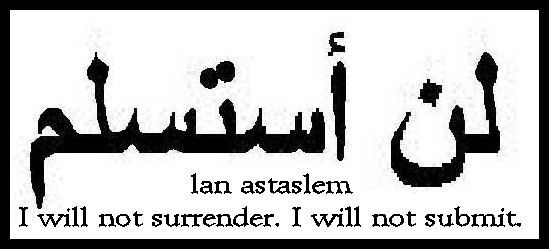ROPMA
ROPMA
Update 02/20/12: The demise of tafsir.com broke the links to Tafsir Ibn Kathir. The links have been changed to point to equivalent text at Islam-Universe.Relevant references to Shari'ah have been added because they confirm the obvious better than anything else can.
So Islam is "a great religion of peace" ? Explain these topic titles from Ibn Kathir's Tafsir. Click them and read their contents. Why did Allah command and order Muslims to commit aggression?
- The Command for Endurance when the Enemy Engaging
- The Command for Jihad against the Disbelievers and the Hypocrites
- The Command to fight Those Who fight Muslims and killing Them wherever They are found
- The Command to strike the Enemies' Necks, tighten Their Bonds, and then free Them either by an Act of Grace or for a Ransom
- The Order to fight People of the Scriptures until They give the Jizyah
- The Order for Jihad against the Disbelievers, the Closest, then the Farthest Areas
- The Order to fight to eradicate Shirk and Kufr
- The Order to fight until there is no more Fitnah
- The Order for Jihad against the Disbelievers and Hypocrites
So terrorism is haram? Explain these tafsir which explain 8:60 and 8:12!!
- Making Preparations for War to strike Fear in the Hearts of the Enemies of Allah
- Muslims invoke Allah for Help, Allah sends the Angels to help Them
In Tafsir Ibn Kathir, you see the ayat which enjoin offensive warfare and the ahadith which confirm them, but you do not see their practical application. For that you must turn to Shari'ah: Islamic law which is based on the Qur'an & hadith.
Would you like a second opinion? Try Risala, the handbook of fiqh belonging to the Maliki school of Islamic Law. Risala defines jihad as " a technical term for the Muslim fighting the unbelievers who have no treaty with the intention of elevating the word of Allah or presenting Islam". Muslims must invite disbelievers to Islam. If they reject Islam, they must demand jizya. If refused, they must wage war.
Would you like a third opinion? Try Hedaya, the handbook of fiqh belonging to the Hanifi school of Islamic Law. From Hedaya, we learn that jihad must be undertaken at all times by some party of the Muslims. We learn that "destruction of the sword is incurred by infidels even though they be not the first aggressors". We also learn that jizya is a punishment for infidelity and a payment in lieu of destruction.











































|